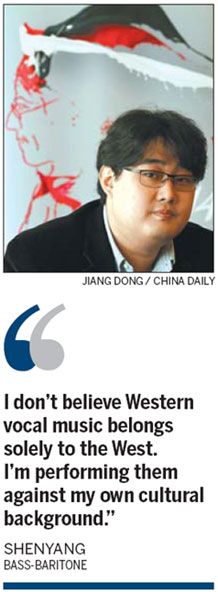

Shenyang explains there was method, rather than mere madness, to his repertoire selection at the recently concluded Beijing Music Festival.
The bass-baritone performed works by not only the acclaimed names of the Romantic Austro-German lieder but also those by the genre's more obscure composers, such as Carl Loewe and Hugo Wolfe. He completed his performance with an encore of four Chinese songs - Xia Zhiqiu's Longing for Home, Chen Tianhe's In the Mountain, and Huang Zi's Plum Blossoms in the Snow and Flower in the Mist.
These four songs were composed between 1919 and 1945, which Shenyang calls "the era of Chinese Romanticism".
"Chinese people were exposed to the outside world after the last dynasty's fall, catalyzing an era of Romanticism in China more than 100 years after the West's," he says.
"These works aren't perfect but stand out because of their sincerity and passion."

As for the little-known foreign songs, he says, "I chose this program to provide a wider picture of the Romantic Austro-German lieder, so audiences can feel the influence of destiny and this historical era on composers."
The 2007 BBC Cardiff Singer of the World will perform three operas during the 2011-12 season. He'll stage Rodelinda and Don Giovanni with the Metropolitan Opera, and La Cenerentola with the Glyndebourne Festival Opera.
"I don't believe Western vocal music belongs solely to the West," the Juilliard School graduate says.
"I'm performing them against my own cultural background."
That's not to say there aren't cultural adjustments that work the other way around in his life and career. Shenyang, who divides his time between China and the United States, changed his name from Shen Yang to avoid the frequent unintentional swapping of his surname and given name by Westerners.
He was born into a musicians' family in Tianjin municipality but didn't study music at his parents' encouragement. It was his own interest that led him to begin vocal training at age 16.
American soprano Renee Fleming discovered Shenyang in 2007, when Fleming was teaching a master class at the Shanghai Conservatory of Music. The instructor found him a vocal coach from the Metropolitan Opera in New York, which proved crucial to his Cardiff victory, he says.
Shenyang says the essentials to becoming an outstanding vocalist are "ego, strength, mentality and fortune".
Italian tenor Carlo Bergonzi claims Shenyang is the best bass-baritone he has heard in his 53-year career.
Conductor Antonio Pappano hails Shenyang as "one in a million".
But Shenyang's story is one of raw talent coupled with refined education.
"I'm sure I borrowed more books and scores from the library than any other student at the Shanghai Conservatory of Music," Shenyang says.
He has spent much of 2011 lecturing on vocalisms' history and aesthetics at Chinese conservatories. The singer also gave a talk on "art songs" after his performance at the Beijing Music Festival.
Shenyang staged a highly acclaimed performance of such works by 16 Chinese composers from the country's "Romantic" period at the Shanghai Grand Theater in May.
The 2010-11 Classical Elites Shanghai awarded the concert as the "best-curated" of the year.
Shenyang believes there are few opportunities to hear Chinese "art songs" from the first half of the 20th century.
"It's a pity that beautiful and dramatic period's repertoire hasn't received due attention," he says.
"Some of the songs haven't even been recorded or published."
The record collector has spent a great deal of time and money hunting for these tunes on vinyl.
A recent treasure he found and showed on his Sina.com Weibo micro blog is a 1950s record by Chinese bass-baritone Yi-Kwei Sze (1915-1994), who achieved international acclaim. He spent $80 to buy the secondhand album from Malaysia.
His study of Western vocal works has led him to give more thought to the dissemination and promotion of Chinese "art songs", he says.
He points to Mahler's Das Lied von der Erde, which he says was inspired by Tang Dynasty (AD 618-907) poets, including Li Bai.
"It's our duty to promote Chinese culture overseas, but the first musical work inspired by Li Bai's poetry came from an Austrian composer," he says.
"This means we haven't lived up to our obligation."
He plans to record more Chinese "art songs" and believes more young musicians from his homeland are gaining global acclaim.
"China will produce more musicians of international caliber as it becomes more open," he says.
"But I hope the world will come to know not only China's musicians but also its musical works."